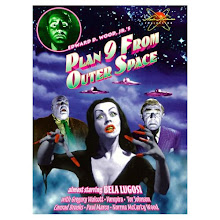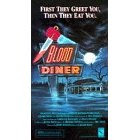by Jason Pyles
[Spoiler alert: This post contains spoilers for “L O S T.”]
True, this site is almost strictly dedicated to discussing unusual films, but with the recent season finale of “L O S T,” I figured I should give it some attention, especially considering my minority opinion of it.
I didn’t start watching “L O S T” when its pilot first aired in September 2004. Nevertheless, sometime in the middle, I started watching the DVDs from the beginning and got caught up, watching — and waiting — ’til the bitter end last night.
While watching Season One I said, “This is a masterpiece!” “‘L O S T’ is the greatest show ever made,” I said. I felt the same way all you Losties feel. I was sold and helplessly hooked.
Then something terrible happened. “L O S T” quickly grew asinine and utterly ridiculous. Yeah, yeah, I was convinced that the island’s supernatural mysteries would eventually be revealed to some grand design. I kept reassuring the naysayers and Doubting Thomases, too, just like the fans are still doing. “Don’t worry,” I’d say. “We are in the hands of not only capable but genius writers. When the answers to these questions are revealed,” I asserted,” “we’ll all be blown away, and you’ll be silenced.” But the naysayers weren’t silenced. I was.
My eyes were first opened when I noticed that many more questions were being raised than were being answered. Like anybody who’s ever had a piggy bank understands, if you take more money out than you put in, you’ll soon be left with an empty piggy bank. And that’s what “L O S T” did to me: It would answer one little question and pose 10 bigger ones. Suspense and mystery are wonderfully entertaining, but there comes a point when the audience’s faithful patience starts being abused.
Not only were loads of more and more questions piling up, the show started having 9-month breaks. 9 months! That’s nearly a year! With such a complicated and intricate show, those long breaks made it impossible to remember what was going on — not that we ever really knew what was going on in the first place.
Some things that bothered me most, described broadly: Very lucky plane crash “survivors” find themselves on a deserted island somewhere in the South Pacific. The island is only so large; they explore it thoroughly. Yet, with each season, more and more characters and noticeable landmarks and places and objects are introduced! People die, but the cast of characters somehow grows larger.
Season Two, the one with the hatch and the numbers and the alarm, is so monotonous. The introduction of Benjamin Linus (as Henry Gale, marooned hot air balloon pilot from Minnesota) is the highlight of the season. Oh, and by the way, there’s a man living down there in that hatch. His name is Desmond. How ’bout that!
Season 3 becomes dark and malicious. “The Others” initially are almost ninja-like phantoms who whisper and spy and kidnap. But no, they actually have book clubs and care about babies being successfully carried to term.
An ill-written episode “Happy Days” is where we get the phrase “jumping the shark.” Well, “L O S T” jumps up on top of the shark and then surfs on it — repeatedly. Sure, sure, I’m OK with supernatural fiction. I can dig it. I like make-believe, and conversely, I’m a man of faith. But “L O S T” has no parameters whatsoever.
No parameters: Films and TV programs portray various universes different from our own. We’ve seen spaceships, aliens, giant apes, zombies, vampires, flying kids and dogs and everything else. But typically, the universe is established early on; we acknowledge this as an audience, and suspend our disbelief that we might allow ourselves to accept this newfound world.
But “L O S T” doesn’t play fairly. It breaks its own rules and cheats. And cheats. And cheats. Ironically, one of the episodes is titled “Deus Ex Machina,” which, in Latin means “God From a Machine,” and refers to a contrived and completely incredible (as in unbelievable) plot device used to bail the writer(s) and the character(s) out of a seemingly impossible situation — such as last night, when mortally wounded Jack magically appears up out of that "cork" pit and in the forest again. “L O S T” wanders and meanders anywhere and everywhere it wants or needs to go. Indeed, “L O S T” asked too much of its viewers; so many events were just too much to swallow.
And speaking of jumping the shark and no parameters, once the time traveling and island-moving and smoke-monstering and sky-lighting and dead-people-reappearing and interconnected coincidences and relationships all started becoming commonplace, the show devolved into nothing more than a fantastical soap opera. Poignant moments of melodrama were interspersed with extraordinary events ... now that’s entertainment, is it not?
Who else got sick of this scenario: “OK. Shag, Scoob, you go here, and I’ll take the girls and go here.” Or “Let’s run to this part of the island,” and then, moments later, “Now, let’s race to this part of the island.” It seemed like every episode the characters were off on a hike somewhere — somewhere new that we’ve never seen before on this relatively small island.
Or what about all the “idiot plotting”: As in, “I know something, but I’m not going to tell these people. They’ll ask me what it is, and I’ll just say, follow me.” Yeah, that makes sense, since there are so many other things to talk about while waltzing through the jungle. Surely there musn’t be any time for discussing revelations about this crazy island we’re stuck on. It drove me nuts how nobody ever told anybody anything. The characters treated one another as the writers treat us: Leave ‘em in the dark, and then kick ‘em in the head once in a while; it's good for 'em.
And supposedly, the writers had the beginning and the ending in mind, but the middle was much more flexible. Well, that’s fine, but most of the insane developments throughout the series ended up being absolutely pointless and inapplicable to the show’s grand scheme. The word “nebulous” comes to mind.
Yes, it's neat that the series began with Jack opening his eyes, and ended with him closing them. Neat. But that kind of book-ending is not new, let’s not forget. I don’t wish to take anything away from this very cool element, but symmetrical introductions and conclusions are an age-old writing technique, so let's not be too impressed with this big pay-off.
And let’s talk more about the final episode. Somebody must have had a brilliant idea that went something like this: “Hey, know what we should do? Let’s just replay all the touching moments between the characters so people will feel whisked away by the emotion of their mental reunions!” It was so manipulative and hollow. Come on, did anyone else think that Juliet's handing Sawyer a candy bar was a little thin for conjuring up those wonderful feelings? Give me a break. Break me off a piece of that Kit-Kat bar.
And wasn’t it convenient that the broken-down airliner was able to be repaired within one hour (instead of five) and then was able to take off on a sandy coast, obtaining enough speed for lift-off. And they surely had enough fuel to get wherever they surely knew where to go. I thought it was a Roland Emmerich movie for a minute.
But I quibble.
I loved Season One. I loved the Season One musical montages at the end of the episodes. I loved the Smoke Monster (before we knew it was a Smoke Monster). I loved what a bad-#$@ Sayid was. I loved Sawyer's nicknames. Some of the flashback subplots were very affecting, such as Locke’s heartbreaking history with his father. And of course, I’m basically IN LOVE with Richard Alpert, the man, the character and his story line. Indeed, his episode was my favorite, but I could have sworn his eyes were blue at some point.
And I guess I can dig what I understood it to be (who knows if this is right): The characters were dead, as Alpert tells them. The Island was a kind of purgatory for these suffering souls who just couldn’t let go of their demons and “move on.” And then, when they were ready to move on, they all did together. When Jack saw his dad again, and everything was good, and his dad explained that they were “dead,” I imagined that heaven is probably something like that. Those we love who preceded us are there to welcome us. I guess that was beautiful.
People say “L O S T” changed television, but I’d suggest that with a little bit of time, those wool-pulled Losties will see that it wasn’t as great as they thought. To be fair, it was built up so much with its mysteries and intrigue, there’s no way the series could have ended profoundly enough to truly satisfy its fans and critiques.
I guess if I had it to do all over again, I wouldn’t. ... Or I would have stopped after Season One. But if I had to watch it over again — and waste another 120-some hours of my life — I would watch it all in a row, without the 9-month breaks, one episode per night, every night, and then maybe I’d appreciate it more. But I won't.
Why? To me “L O S T” is a lost cause and a real loss.
P.S. Why does the island statue only have four toes? That's probably what I wanted to know the most.
Addendum: Here is the hilarious reward for reading my comments: I found this video — thanks to David Chen of The /Filmcast. He posted this link of "Unanswered 'L O S T' Questions" on Twitter, and it captures EXACTLY how I feel and, you'll agree, illustrates what I was saying about most of the show's mysteries being nebulous, pointless and ultimately unrelated: Again, hilarious! Please watch. Thanks, Dave!





























































